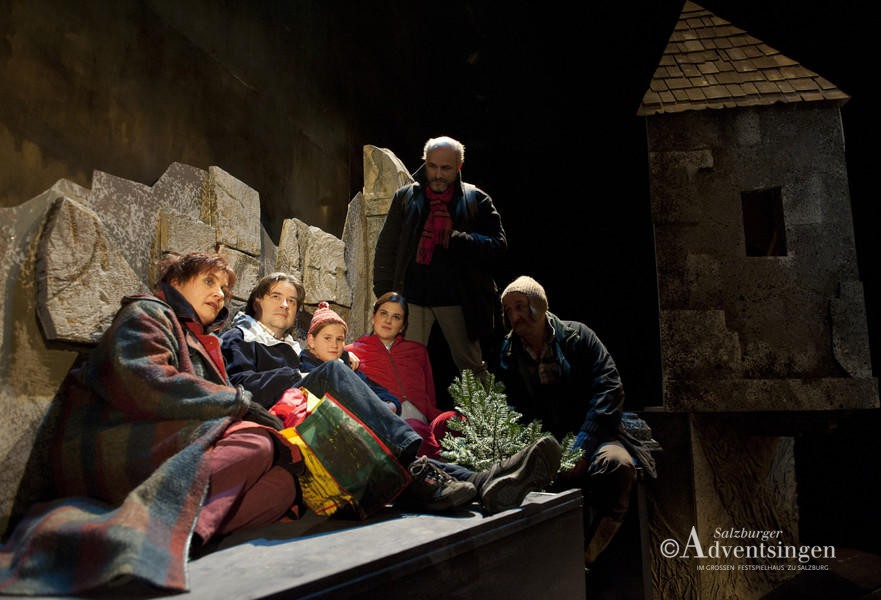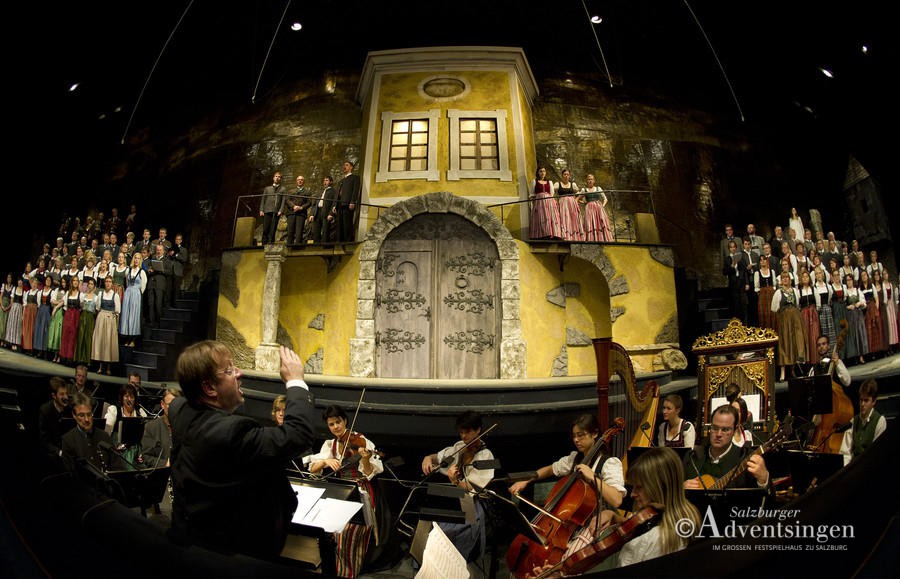The piece 2010
Wer klopfet an
The search for a place to stay
The search for shelter today, depicted with homeless people from K-Berg (who could also be in any other city) and a refugee family marked by fate, forms the prologue and hopefully also the memorable epilogue of this year’s work.
The act


Elements of folk music
The folk music elements of the new work range from the incomparable music of Tobi Reiser, compositions and new pieces by Reinhold Schmid and Martin Fuchsberger to folk songs that fit the respective theme, such as the song “Roter Mohn”, in which Joseph’s longing for love, but also a foreshadowing of a bleeding, tearful love in the Passion can already be felt.
So there is much that is new about this year’s Advent Singing, and yet these are only cautious steps in the 64-year success story of the Salzburg Advent Singing.
Hans Köhl, General Director
Wer klopfet an 2010
Picture gallery
The piece 2010
Contributor
Solists
Simone Peßenteiner-Vierlinger (Sopran)
Bernhard Teufl (Tenor)
Magdalena Hinz (Sopran)
Ilse Grießenauer (Sopran)
Felix Reinhard Leitner (Bass)
Doktor: Andreas Winklhofer,
Bergfee: Veronika Pernthaner,
Petzi: Matthias Hochradl
Alban: Johann Winkler,
Luljeta: Sarah Pernthaner,
Manjola: Helene Wimmer
Peter Dominik Meisnitzer-Aster
Theresia Lena Rettensteiner
Stefan Andreas Rettensteiner
Salzburger Hirtenkinder
Vroni: Stefanie Engel (Klarinette),
Ruap: Manuel Engel (Bassgeige),
Lisi: Theresia Essl (Gitarre),
Seppi: Martin Grabner (Klarinette),
Lippei: Felix Grabner (Trompete),
Sarah: Stefanie Grießne (Pascherin),
Gretl: Carolin Hollweger (Pascherin),
Lena: Sarah Huber (Pascherin),
Peter: Dominik Meisnitzer-Aster (Harmonika),
Simmerl: Simon Nagl (Horn),
Berni: Lukas Perschl (Pascher),
Mizzi: Christina Rest (Oboe),
Thresl: Lena Rettensteiner (Hackbrett),
Steffi: Andreas Rettensteiner (Harmonika),
Hias: Simon Wimmer (Harmonika),
Maniola: Helene Wimmer (Pascherin),
Hansei: Tobias Wimmer (Pascher),
Wawi Magdalena Winkler (Klarinette)
Einstudierung, Betreuung
Markus Helminger, Kaspar Fischbacher, Stefan Gfrerer, Hildegard Stofferin, Birgit Lang, Albina Schwaiger, Gudrun Köhl-Korbuly
Choir
90 Sängerinnen und Sänger;
Einstudierung / Leitung: Burgi Vötterl
Vocalensembles
Sopran: Anna Bahngruber,
Mezzosopran: Christa Fuchsberger,
Alt: Anna Santner
1. Tenor: Sebastian Fuchsberger/Lukas Bahngruber,
2. Tenor: Hans Köhl, Bariton: Martin Fuchsberger,
Bass: Josef Fuchsberger
Orchestra
Gitarre: Reinhold Schmid,
Zither: Johannes Rohrer,
Hackbrett: Kerstin Schmid-Pleschonig,
Harfe: Stefanie Geierstanger,
Kontrabass: Max Schmid,
Orgelportativ: Barbara Schmelz
Flöte: Gundl Aggermann,
Geige: Burgi Vötterl,
Geige: Maria Dengg,
Viola: Andrea Brucker,
Cello: Sylvia Demgenski
Trompete, Flügelhorn, Lg: Horst Hofer;
Trompete, Flügelhorn: Gerhard Gergely;
Trompete, Flügelhorn: Zoran Curovic;
Posaune: Christian Winter;
Posaune: Thomas Höger;
Posaune: Erwin Wendl
Trompete: Ltg. Horst Hofer,
Trompete: Erik Kern,
Trompete: Zoran Curovic,
Posaune: Dusan Kranjc,
Posaune: Thomas Höger,
Posaune: Erwin Wendl,
Horn: Christian Sperl,
Horn: Andreas Stopfner
Oboe: Ltg. Gottfried Linsinger,
Fagott: Gerti Hollweger,
Klarinette: Anton Gmachl,
Klarinette/Bassklarinette: Stefan Promegger
Martin Grubinger
Technical Support, Equipment
Heinz Ilsanker, Werner Breitenfelder
Edwin Pfanzagl – Cardone,
Günther Harner, Bernhard Brunner
Joinery Alfred Laserer, Gosau